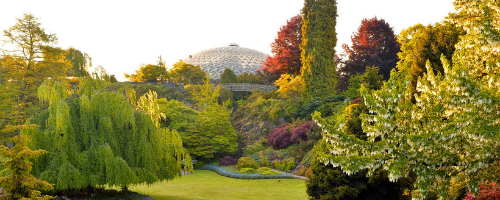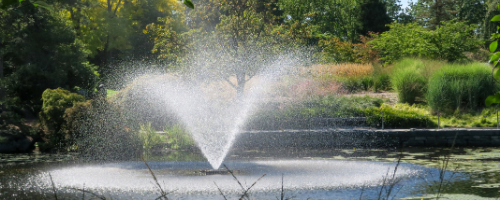VBGA-SFU Fellowship Receives United Nations Recognition
Thank you to our donors whose generous support has made this partnership possible.
 The establishment of the VBGA Fellowship in 2020 (in partnership with SFU’s Institute for Environmental Learning), means that VanDusen Botanical Garden and Bloedel Conservatory will become unique sites for a vibrant and expanding research program to study the potential and efficacy of using these unique spaces as locations for diverse and inclusive environmental learning (for both K-12 students and their teachers). Graduate students proposed for these new fellowships will be experienced or promising researchers enrolled at a BC Postsecondary Institution who wish to undertake community-engaged research and work collaboratively with SFU’s IEL and the VBGA to formulate a program of participatory action research.
The establishment of the VBGA Fellowship in 2020 (in partnership with SFU’s Institute for Environmental Learning), means that VanDusen Botanical Garden and Bloedel Conservatory will become unique sites for a vibrant and expanding research program to study the potential and efficacy of using these unique spaces as locations for diverse and inclusive environmental learning (for both K-12 students and their teachers). Graduate students proposed for these new fellowships will be experienced or promising researchers enrolled at a BC Postsecondary Institution who wish to undertake community-engaged research and work collaboratively with SFU’s IEL and the VBGA to formulate a program of participatory action research.
The VBGA Fellowship offers graduate students the opportunity to partake in action-oriented research of environmental education programs at VanDusen Botanical Garden and Bloedel Conservatory. In 2020, the Fellowship was recognized as an Acknowledged Flagship Project by the United Nations University Regional Centre of Expertise on Education for Sustainable Development for its contribution to Sustainable Development Goal 11: Sustainable Cities and Communities. Each year, two fellows supervised by Dr. David Zandvliet (SFU-IEL) and the VBGA’s Education Department work to evaluate and strengthen educational programming and capacity-building strategies – using a participatory action research approach – within a diverse, urban community context.
Humans are living in the world unsustainably, changing the global climate, over-consuming, while remaining detached from the very ecosystems we are a part of. This is especially true within large urban centres such as Vancouver where for many, meaningful access to natural spaces is made difficult or is constrained by cultural and/or economic factors. Botanical gardens have a unique opportunity to both develop and implement formal and informal programming to remedy this situation: having locations directly embedded within the urban fabric of a major city while also benefiting from a wealth of biological and cultural diversity in their living collections.
Fiona Wu, one of the VBGA Fellows in 2020, reflects her experience in the program:
“For lack of a better adjective, 2020 has certainly been an interesting year for our world. As someone whose relationship with VanDusen only began to develop in 2020, it has also been a very interesting year at the Garden. Prior to March 2020, you may have seen me wandering around the Garden with a badge, inscribed with “Fiona Wu – VBGA Education Fellow.” This inscription turned many heads, but few were bold enough to ask me what “Education Fellow” really meant. So, please let me introduce myself and my role at the Garden.
I juggle many hats, though all have the same interests at their core: education and the environment. I am a schoolteacher in the Burnaby School District where I teach French Immersion Kindergarten. I am also a graduate student at Simon Fraser University, pursuing a Master’s in Ecological Education. Because of my interest in education and the environment, a professor at SFU, Dr. David Zandvliet, introduced me to the Institute for Environmental Learning (IEL). It is through a partnership developed between IEL and the VBGA that a fellowship was formed, which I am grateful to be a part of. This fellowship focuses on educational programming at the Garden and research around botanical gardens. As part of this fellowship, I am working on a research project that seeks to assess the impact of educational programs for children and families at the Garden. So far I have found this work to be invigorating and formational.
Through this fellowship, I have had the privilege to experience the Garden’s rich and diverse offerings. For example, I have had the opportunity to write and facilitate parts of Strategizing Sustainability, the garden’s newest field trip program; I have also helped with crafts at Preschool Storytime and I spent a week with the Dirt to Dinner Summer Camp. Through all these experiences and opportunities, I’ve seen much of the educational programming that VanDusen has to offer. I have been consistently impressed by the creativity and adaptability of the Education Department at the VBGA. While the COVID-19 pandemic meant that learning could not continue in the same way it once did, the VBGA has consistently found ways to faithfully and creatively deliver high-quality education in every circumstance. By moving school programs and adult education courses online, to ensuring that camps and nature club programs follow the Health Authority’s safety measures, these are just some of the ways that the VBGA has continued to deliver learning that fosters an appreciation for biodiversity and a lifelong love of plants and gardens.
As a teacher I’ve noticed that my colleagues are thinking about garden programs and outdoor education more than ever as we seek to teach safely and excellently amidst this current pandemic. Never before has there been such interest in outdoor education and spaces such as VanDusen. Resources supporting educators in this area, which the VBGA provides, are crucial to delivering high-quality education during this pandemic. As a teacher, I’m very grateful for all the hard work that the VBGA does and makes available to the public, and for the generosity of VBGA donors who make the diverse collections and programs at VanDusen possible. And as a fellow member of the VBGA, I am inspired by the creativity and adaptability of my colleagues in how they think about, and deliver, public education and garden access for people of all ages and walks of life. Despite today’s uncertainties, I am reminded of the words of Audrey Hepburn, that “to plant a garden is to believe in tomorrow.”’

